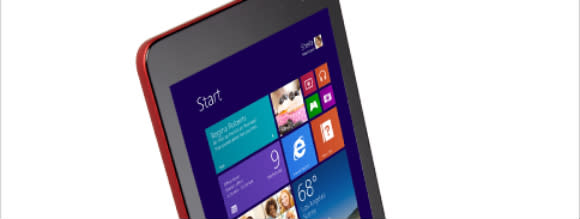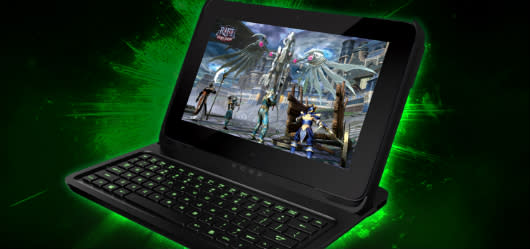MMObility: Windows 8 tablets help MMO fans go mobile
One of the most interesting parts of covering the mobile gaming industry for this column is watching technologies move at such blinding speeds. Just over the course of this column's run, I have seen my own tech double and triple in speed while halving in size and weight. I've also had to try to predict how the market will go so I can keep an eye on games and genres.
In one of the stranger turns of recent events, I've watched as Windows 8, RT, and 8.1 have slowly crept into the market in an attempt to pull people back to the desktop... sort of. This is all possible simply because the desktop PC has reimagined itself in a smaller form, something that I am fond of seeing. Even though I predict that gamers will one day do everything on a tablet (with an optional dock or larger-screen connection), I have to admit that I am surprised at how fast Windows tablets are moving into the spotlight. Sure, they are claiming just a single-digit percentage of the marketplace according to this report in April, well behind Android and iOS, but the numbers continue to rise. That's pretty startling.
What does this mean for MMO gamers?

Don't get me wrong; I am not claiming that iOS or Android is dying off while Microsoft takes back the lead with the new Surface 2. No, it's too early to claim anything like that. What I am talking about is a cultural shift towards acceptance of the OS that will likely continue to grow thanks to tinier desktops and the widespread use of the Windows desktop OS.
When I mention tiny desktops, I am not talking a literal desktop PC that has a smaller footprint. I am referring to miniature PCs that run full Windows 8.1. I've talked about Windows RT before, and Microsoft swears that the OS is sticking around. I like RT just fine, but that's only because it is a fine OS, not because it gives access to a useless desktop. Windows RT was not a bad OS because it ran poorly or was ugly to look at; it is mostly just an OS with fewer app and game choices.
At the time that I bought my Windows RT tablet, full Windows tablets were not as common as they are now. Now we are seeing full Windows running on a large variety of devices, from Dell's Venue 8 and 11 to other companies' portable PCs. The newer line of Intel processors promise longer battery life with more power than previous processors and can run full Windows, unlike ARM-based processors that can run only RT. That means tablets that run a full Windows experience are becoming more common. It does not mean that we will soon replace massive, high-powered desktops with a small tablet -- not yet anyway -- but the currently strong tablet and mobile market will only grow stronger because it is now absorbing the PC market.
My vision of the future is pretty simple. Gamers will own a mobile device that is just as capable in many ways as their desktop cousins. These mobile gamers can then wirelessly connect that mobile device to a larger screen in order to enjoy everything that comes with gaming while on a couch. Heavy, expensive gaming PCs or systems won't go anyway as there will always be a need for more pixels or better graphics, but the bulk of the everyday gamer's life might be spent on a tablet.
All of this is to say that Windows 8.1 has sneaked into the tablet market and will likely continue to do so because people are simply becoming used to the OS. It will cease to be a good mobile OS with a useless desktop mode (RT) and will become a standard desktop OS with mobile accessibility and design. A popular game like Mabinogi or EverQuest might someday be enjoyed on a tablet without having to wait for some sort of browser version or streaming client. Soon enough, we might see desktop MMOs like RIFT or Star Wars: The Old Republic on a lower-end tablet thanks to even better mobile processors.
I am currently in the process of getting rid of my RT tablet and will eventually move up to a full Windows 8.1 tablet. I am eyeing the Dell Venue Pro 11 simply because I would no longer have to live with RT's limited marketplace that cuts out many MMOs and popular features like Google Chrome. If I paid a few hundred more, I could have a 4th Generation Core i5 processor in that 11-inch tablet, something that could easily play many of my favorite MMOs, browser or not.

I am still surprised at how fast Windows-based tablets have grown. We are still seeing Windows RT tablets for sale, but I have a feeling that now that users have grown more accustomed to Windows 8 (because they have on the desktop), they will become more comfortable with a Windows-based tablet as well. Does that mean I think that Windows phones will grow in the market as well? I'll save that for a different article.
The fact is that the Windows desktop is the most popular OS for MMO gamers there is. But it's also a fact that many of those MMOs do not require anything like a powerful gaming PC to run (Grepolis, Free Realms, EverQuest, Mabinogi, Battlestar Galactica Online, RuneScape, Lord of the Rings Online, for example), so soon a Windows tablet with newer, more powerful processors might be able to step in.
It will be an interesting 2014, for sure. Android and iOS still fight for the top spots in mobile gaming, and both continue to grow and offer fantastic experiences. For many MMOers, however, there is no beating that Windows PC experience. We'll see whether Windows tablets will be able to attract those players.

Each week in MMObility, Beau Hindman dives into the murky waters of the most accessible and travel-friendly games around, including browser-based and smartphone MMOs. Join him as he investigates the best, worst, and most daring games to hit the smallest devices! Email him suggestions, or follow him on Twitter and Facebook.


